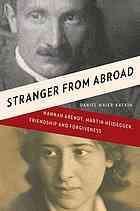
Stranger from Abroad
Hannah Arendt, Martin Heidegger, Friendship and Forgiveness
- اطلاعات
- نقد و بررسی
- دیدگاه کاربران
نقد و بررسی

December 14, 2009
A competent if pedestrian account of the relationship between two major figures of 20th-century philosophy that focuses on the influence of their friendship upon Arendt’s intellectual development. Tracing their bond from when the young Arendt was Heidegger’s student and subsequently his lover, Maier-Katkin, professor of criminology at Florida State University, offers an intellectual biography of the Jewish political philosopher whose preoccupations included pluralism, injustice, and the nature of evil, against the background of her lifelong connection with a thinker whose own history was marred by involvement with Nazism. The author is admirably evenhanded in his assessment of this dimension of Heidegger’s life, but his sympathy clearly lies with Arendt, whose writings, in particular her prescient essays on Israel and her account of the Adolf Eichmann trial, he passionately defends. Overall, the book offers little insight into either of its subjects, relying too much on previous biographies and synopses of Arendt’s major writings. The author’s guiding insight, that Arendt’s friendship with Heidegger exemplifies her notions of thoughtfulness and forgiveness, is compelling but regrettably underdeveloped. But at its best the book offers a fascinating snapshot of the divergent ways two towering intellects responded to the 20th century’s darkest moments.

December 15, 2009
Two of the 20th-century's great thinkers become entangled in romance, the Holocaust, estrangement and reconciliation.
In 1924, Hannah Arendt (1906–1965) was a student of Martin Heidegger (1889–1976) at the University of Marburg in Germany. Although he was married and a father, their relationship quickly became intimate as well as intellectual, and it endured—with long hiatuses, some angry, some merely neglectful, and fundamental alterations—until her death. Although Maier-Katkin (Criminology and Criminal Justice/Florida State Univ.) declares"very weak" the evidence of Heidegger's anti-Semitism and his involvement with the Nazis before they assumed control of the country, he joined the party in 1933 and allowed them to use his name and considerable scholarly prestige to help legitimize their dominion. In 1936 he was still wearing the party's lapel pin, though the Nazi authorities, skeptical about his loyalty, never granted him the audience with Hitler he'd once sought. Meanwhile, Arendt—who had completed her doctorate—and her family fled to France, managing through her connections to obtain visas for the United States. They arrived in 1941. Early in the narrative, Maier-Katkin alternates between the two principals, charting their romantic lives, marriages, scholarly work and publications. But after Arendt's arrival in the United States, the story becomes hers. Although she knew little English, she soon mastered it and had early editorial jobs before commencing her distinguished teaching and writing careers. The author is an advocate for both Heidegger and Arendt—though he is far harder on the former, calling the philosopher's actions"shameful"—and he provides a lengthy defense of Arendt's most controversial work, Eichmann in Jerusalem (1963), and its analysis of what she called"the banality of evil," a phrase that continues to foment fiery debate nearly a half-century later.
Thoroughly researched, but often reads like a sympathetic, tendentious lawyer's brief.
(COPYRIGHT (2009) KIRKUS REVIEWS/NIELSEN BUSINESS MEDIA, INC. ALL RIGHTS RESERVED.)

February 1, 2010
Personal interest seems to have motivated Maier-Katkin (criminology, Florida State Univ.) to research and recapitulate the relationship between Nazification-prone Heidegger and his Jewish protoge. Maier-Katkin keeps at least one of the two center stage as he works through developments and changes in world events, from the onset of their love affair when she was a student, and evolving philosophical interests held by each of them and their contemporaries. Heidegger's personal and political opportunism, and Arendt's struggles to be what she would consider fair in her dealings with all are made accessible to popular readers in this version of their joint and separate lives. VERDICT This is more a joint biography than a comparison and contrast of philosophical theory. As such, it is best suited to readers in public and undergraduate libraries.Francisca Goldsmith, Halifax P.L., NS
Copyright 2010 Library Journal, LLC Used with permission.

Starred review from February 1, 2010
Richard Wolin argued in Heideggers Children (2001) that when Jewish writer Hannah Arendt forgave her former professorand loverMartin Heidegger for supporting the Nazis, she succumbed to misgivings about her own Jewishness and to resurgent amorous passions. But after carefully investigating the Arendt-Heidegger friendship, Maier-Katkin reaches a different conclusion. In Arendts eventual reconciliation with her grievously erring mentor, he sees the culmination of a career of bravely independent thinking. Personal correspondence reveals the depth and persistence of Arendts emotional attachment to Heidegger. But in her emergence as a public intellectual, she advances perspectives far from Heideggers, as evidenced in her landmark study The Origins of Totalitarianism, where she dissects the phenomenon that absorbed her former teacher. But Maier-Katkin also recognizes her intellectual autonomy in her critique of Jewish Zionism as a dangerously ethnocentric movement and in her controversial characterization of Nazi Adolf Eichmanns crimes as the banality of evil. It is indeed in the Eichmann epiphany that Arendt finds the surprising motivation to reconsider her ruptured relationship with Heidegger and consequently to extend to him the kind of world-embracing love that makes new beginnings possible. Readers welcoming diverse perspectives will benefit from this inquiry into a relationship uniquely freighted with historical meaning.(Reprinted with permission of Booklist, copyright 2010, American Library Association.)




دیدگاه کاربران